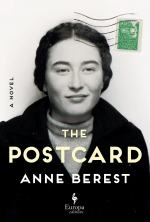|
This section contains 763 words (approx. 2 pages at 400 words per page) |

|
The Postcard Summary & Study Guide Description
The Postcard Summary & Study Guide includes comprehensive information and analysis to help you understand the book. This study guide contains the following sections:
This detailed literature summary also contains Quotes and a Free Quiz on The Postcard by Anne Berest.
The following version of this book was used to create the guide: Berest, Anne. The Postcard. Europa Editions, 2023.
Anne Berest’s novel The Postcard, follows the protagonist, Anne Berest, as she investigates the sender of a mysterious postcard. The novel is written predominantly from Anne's first person point of view and vacillates between the past and present tenses. For the sake of clarity the following summary employs the past tense.
At the outset of the text, Anne’s mother, Lélia received an anonymous postcard with the names of her relatives written on it. Ephraïm, Emma, Jacques, and Noémie were all murdered during the Holocaust at Auschwitz. Years later, Anne asked her mother to tell her about their family history; Lélia had been researching the family’s past for years. At the start of the twentieth century, the Rabinovitches lived in Russia. However, shortly after Ephraïm married Emma, his father, Nachman, implored them to leave and flee the anti-Semitism, which was gaining fervor. Later, Ephraïm and Emma moved to Riga. While their time in Latvia was initially idyllic, Ephraïm’s business failed, and they were accosted by hate speech. They moved once again, this time to Palestine. After five years of struggling, Ephraïm, Emma and their three children moved to Paris. The patriarch believed that he could solve the family’s hardships through naturalization in France. Myriam and Noémie excelled in school but were shocked when the numerus clausus was enacted. They thought the anti-Semitic legislation was limited to their parents’ pasts. When Myriam began tutoring Vincente, they began to date and married soon afterward. However, the Rabinovitch family did not return to Paris that summer. When the occupation began, the Rabinovitches stayed in Les Forges. Later, when officers arrived at the house, Noémie and Jacques were arrested and taken to Germany. Myriam wanted to go with her siblings, but her father made her hide in the garden. That evening, she biked back to Paris. Vincente and Jeanine smuggled her out of the city. Shortly after, Ephraïm and Emma were also arrested. They were killed in the gas chambers upon arriving at Auschwitz.
In the narrative present, in Book II, Anne attended Pesach dinner at Georges’ house. She was hurt by Déborah’s comments when she insinuated that Anne only claimed to be Jewish when it suited her. Anne had struggled to amalgamate her secular childhood with her family’s religious heritage her entire life. When she talked to her daughter, Clara, about an anti-Semitic incident on the playground, her thoughts turned to the postcard. Anne decided to find the sender and asked Lélia for assistance. She spoke with handwriting experts and private detectives, but they were unable to offer insight. As her research continued, Anne began to investigate Myriam’s life during the war. Lélia had never inspected what happened to her mother after she escaped Paris because Myriam refused to talk about her life when she was alive. In Book III, Anne wrote to her sister Claire contemplating how their middle names, Myriam and Noémie, had impacted their identities.
In Book IV, Myriam left the chateau with Vincente, and they stayed in Marseille, which was still a safe zone. However, their papers were compromised, and they were forced to leave shortly after. Vincente explained that he and Jeanine were members of the Resistance and brought Myriam into the operation. They moved to The Hanged Man’s House on the Plateau des Claparèdes. Vincente left shortly after, and Myriam lived alone. She began transcribing BBC broadcasts for the Resistance. Later, when Vincente returned, he brought Yves Bouveris who had defied the German draft of French civilians. The trio began a love affair in the time they lived in hiding. When they returned to Paris, Myriam told Yves she was pregnant with Vincente’s child. She and her husband worked for the Franco-Polish intelligence network F2 at the end of the war. When prisoners began returning to French soil, Myriam searched for her family. She was desperate to believe they were still alive. Later, she moved to Germany to continue her search, leaving Lélia behind in Céreste. At the close of the novel, Anne visited the town where Myriam spent the last years of her life. When she spoke with her grandmother’s former nurse, Juliette explained that Myriam wrote the postcard. She knew she was losing her memory and recorded her family members’ names to ensure she would not forget them.
Read more from the Study Guide
|
This section contains 763 words (approx. 2 pages at 400 words per page) |

|



